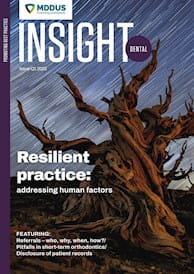 Q. One of our practice employees, who is in her 50s, has been having unexpected issues with her performance at work. She is sometimes forgetful and also takes occasional short-notice absences away from her post during the working day. She has said something about going through the menopause but the practice is so busy we don’t have time to deal with that. We just need someone we can rely on to do the job properly. What should we do?
Q. One of our practice employees, who is in her 50s, has been having unexpected issues with her performance at work. She is sometimes forgetful and also takes occasional short-notice absences away from her post during the working day. She has said something about going through the menopause but the practice is so busy we don’t have time to deal with that. We just need someone we can rely on to do the job properly. What should we do?
A. We recognise that practices face ever increasing demands on resources. But women make up more than 75 per cent of the NHS workforce and it is essential that they have all the support they need to be healthy and safe at work. Women in their 40s and 50s will inevitably experience the menopause at some point in their lives although it can affect younger women too through a medical or surgical procedure.
For some, the physical and emotional changes can be significant and difficult to deal with and these issues can be made worse by the fact there remains considerable ignorance and misunderstanding about the menopause, with it often being treated as a taboo subject or even being the butt of jokes.
Protection under the law
It is important to note that employees experiencing menopause are protected by certain pieces of legislation. Most notably is the Equality Act 2010, where menopause is largely covered under the protected characteristics of age, sex and disability discrimination. The Health and Safety at Work Act 1974 also provides for safe working, which includes working conditions related to menopausal symptoms.
So it would be very unwise for any employer to make decisions about an employee’s role purely on the basis that their menopausal symptoms are perceived as “an inconvenience”.
Symptoms
These can vary but around 80 per cent of women experience noticeable changes and 45 per cent find their symptoms difficult to deal with. The impact of these symptoms can have an adverse impact on self confidence, mental health, and relationships with others both inside and outside the workplace.
Symptoms include :
- hot flushes, night sweats/sleep disturbance
- heavy and painful periods/clots
- restless leg syndrome
- low mood, increased anxiety or panic attacks
- fatigue
- urinary problems
- joint and muscle aches
- weight gain
- headaches/migraines
- hair loss
- osteoporosis.
Good work practices
Practices can benefit from negotiating a workplace menopause policy. This would agree good work practices in areas such as health and safety, sickness absence, flexible working and a performance management approach that takes into account menopausal symptoms.
Practical changes
- Engage with your employees and ask them what type of support they would find helpful.
- Ensure that all managers have an awareness on how the menopause can affect work. Take into account possible memory loss, poor concentration or lack of confidence.
- Be flexible with performance management to avoid the unfair implementation of capability and disciplinary procedures.
- Ensure that employees feel able to approach line managers and discuss how they are feeling.
- With the employee’s consent, a referral to occupational health may be helpful.
- Ensure the practice has a flexible working policy that meets the needs of workers experiencing the menopause. They may require more “comfort breaks” during the day.
- Consider whether to record menopause symptoms in the same way as any other sickness absence. Reasonable adjustments should be offered to overcome any barriers.
- Consider practical measures such as good ventilation, access to drinking water and adequate toilet facilities, and flexibility over uniforms.
To conclude, experiencing the menopause can be a very difficult time for some women and as a supportive employer, you should ensure that you are aware of how it can affect them and what you can do to help. You will be rewarded with happier, more productive staff who can navigate this time in their lives with less pressure.
Janice Sibbald is an employment law adviser at MDDUS
Further information
This page was correct at the time of publication. Any guidance is intended as general guidance for members only. If you are a member and need specific advice relating to your own circumstances, please contact one of our advisers.
Read more from this issue of Insight Dental

Save this article
Save this article to a list of favourite articles which members can access in their account.
Save to library
